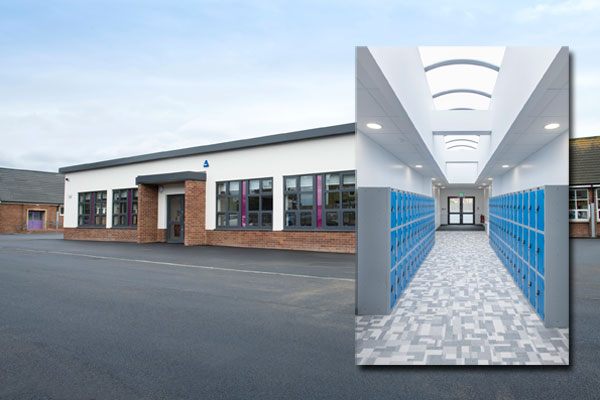As offsite construction growth outstrips traditional methods, Gilberts has introduced a solution that simplifies incorporation of building services.
The company’s MFS (Mistrale Fusion) provides a stand-alone unit, requiring no ductwork or plant, to ensure a comfortable ambient environment within each space- in air quality AND air temperature.
It means one MFS delivers ventilation, cooling and heating as needed, with no external connections. Once on site, annual design consumption of just 34kw per classroom means that Gilberts’ MFS can cost as little as £5*/classroom/year to operate.
Installed through an external façade or window, Mistrale MFS mixes internal and external air to ventilate the internal space. Each MFS unit features a mixing damper within, modulating airflow to allow the new, fresh air to mix with the warm exhaust air, thus utilising its heat without the need for an exchanger. The integrated low energy fan energises to blend the internal air, ensuring an even distribution of airflow, with control over temperature and CO2 levels within, and maintenance of a comfortable internal environment for occupants. An optional LPHW coil delivers a heat boost, obviating the need to incorporate radiators.
In terms of capacity, just 2 no MFS128 or a single MFS256 will service a 55m2 room (equivalent to a 32 pupil classroom achieving the 8litres/sec/person fresh air required by current Department of Education Building Bulletin (BB101) and PBSP guidelines). Each unit also achieves relevant acoustic considerations: its operational ‘noise’ is less than 30dbA.
Error, group does not exist! Check your syntax! (ID: 2)
Gilberts has further taken care to attain compliance with Building Regulations Approved Document L: MFS attains air leakage better than legislative requirements- 5m3/HR/m2, and a U value of 1W/m2/°C. As with all Gilberts’ ventilation solutions, it delivers efficient weather performance via its bespoke louvre system.
“Offsite construction is currently predicted to grow at 30%pa, so there is a significant need for stand-alone building services solutions that facilitate efficient production techniques,” observes Gilberts’ Sales Director Ian Rogers. “MFS is already proven in mainstream construction to deliver a value engineered solution, ensuring an appropriate internal environment for an occupied space.”
Family-owned Gilberts has a heritage spanning more than 60 years, with a management team recognised as experts within their respective fields. At its 95,000 sq ft head office facility, it designs, manufactures and supplies a comprehensive range of components designed to deliver efficient air movement strategies in commercial environments. Products are predominantly manufactured in-house, to the extent it even designs and manufactures its own jigs and tools; ventilation products are validated in its purpose-designed on-site, in-house test facility.







